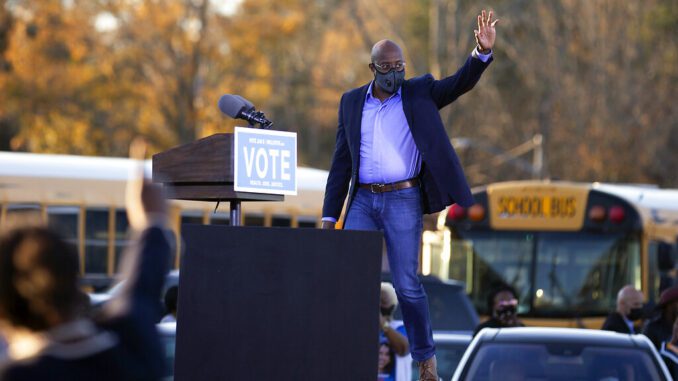
During Easter weekend, U.S. Sen. Raphael G. Warnock, D-Ga., received some heavy criticism for a tweet from his account that stated: “The meaning of Easter is more transcendent than the resurrection of Jesus Christ. Whether you are Christian or not, through a commitment to helping others we are able to save ourselves.” The backlash was instant for Warnock, the senior pastor of the historic Ebenezer Baptist Church in Atlanta and the first African American to represent Georgia in the Senate. The tweet was quickly deleted, and a member of Warnock’s office said the message was posted by staff but not approved. Yet, there is ongoing discussion regarding what it truly means to be a follower of Christ and factions within the faith. The fact that such divisions have placed Christians into manmade political classifications of conservative, moderate and progressive is troubling because the church is supposed to be united in the truth of the gospel, as Philippians 3:16 instructs believers to “walk by the same rule,” with “rule” meaning canon or standard.
When I read Warnock’s tweet, I was befuddled at the assertion that Easter is “more transcendent” than Jesus’ resurrection simply because the meaning of “transcendent” is something that surpasses the limits of our ordinary, human experience. To believe that Jesus Christ, also referenced as the man-God, conquered death, hell and the grave is the essence of transcendence. I think the latter part of the tweet claiming that we are “able to save ourselves” by being dedicated to helping others was the basis of the rebuke that Warnock received. No one is going to argue that doing good deeds to help those in need is not a part of the Christian calling; however, Scripture clearly teaches that we cannot save ourselves by works. Now, do not confuse this with James 2:20, which states that “faith without works is dead.” This text explains that faith produces works, and the following verses point out that believers are “justified” or “proven” by works, but only faith in God results in being imputed with righteousness. Thus, works, while good, are not good enough to save us. The Bible also warns against pride that can settle in our sinful nature from doing good works in Ephesians 2:8-9, stating that we are saved by grace through faith, not of ourselves, and “not of works, lest any man should boast.”
Another point that I want to make regarding works is how deeds are framed in the current social justice movement in which many black churches have taken a lead. Warnock preached about the struggle of racial oppression, inequality and inequity leading up to Martin Luther King Jr. Day in January. While the challenges faced by those in poverty and those marginalized in our communities have always been at the core of the battleground for civil rights, churches must be careful not to let their efforts against injustice overshadow the life-transformative power of the gospel. Jesus was deeply concerned about the poor and the oppressed, as Luke 4:18 shows, but careful study of Scripture reveals that His main purpose in coming was to eradicate sin. One of the best illustrations of this is found in John 3 when Jesus meets with Nicodemus, an esteemed Pharisee. In answering Nicodemus’ questions, Jesus tells him that a man cannot see the Kingdom of God unless he is born of water and of the Spirit. Water is a symbol of the cleansing and regeneration of the Holy Spirit. This conversation was beautifully reimagined in the TV series “The Chosen” when Nicodemus is confused that Jesus did not come to deliver the Jews from Roman tyranny. In that scene, Jesus simply states that He came to save man from spiritual death, basically “quickening” us, as we were “dead in trespasses and sins” (Ephesians 2:1). When a person is quickened or made alive through the Spirit of Christ, he or she will not harbor hatred, racism and prejudice in their hearts. All of our good works, while noble in nature, cannot transform the heart.
I write my disagreement with Warnock’s tweet in love as a fellow sister in Christ. As a native Georgian, I am proud of his historic Senate victory, but I am also praying for him as a man of God. In this abrasive political climate, his faith is going to be severely tested, and it’s the only foundation that will sustain him.
Dr. Jessica A. Johnson is a lecturer in the English department at Ohio State University’s Lima campus.



